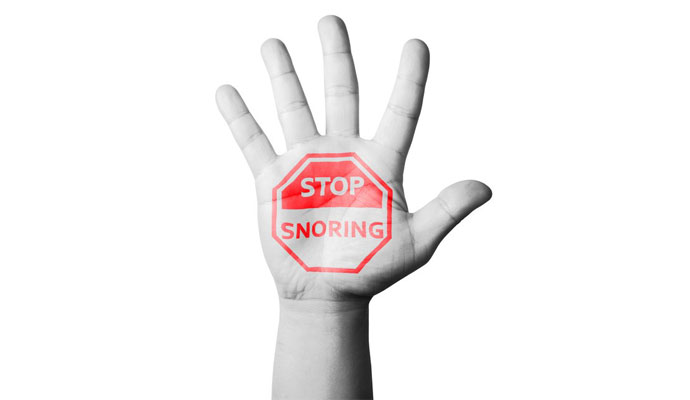WHAT IS SNORING?
Snoring is the resulting sound that occurs due to obstructed air movement during breathing while you are asleep. In some cases the sound may be soft, but in other cases, it can be loud and unpleasant.
Snoring during sleep may be a sign of obstructive sleep apnea (OSA).
What Are The Symptoms Of Snoring?
It is important to understand that snoring is a medical condition that deprives the body of appropriate rest. Aside from the audible sounds of snoring, there are several symptoms that may indicate a chronic snoring problem. These include:
- Excessive daytime sleepiness
- Difficulty concentrating
- Sore throat
- Restless sleep
- Gasping or choking at night
- High blood pressure
- Chest pain at night
- Noise during sleep
What Causes Snoring?
Snoring is caused by many factors. When you are sleeping, the muscles in the roof of your mouth, known as the soft palate, tongue and throat relax. Sometimes the tissues in your throat can relax so much that they partially block your airway and in turn, vibrate.
The main factors that contribute to snoring include:
Your mouth anatomy: Having a low, thick soft palate can narrow your airway. People who are overweight may have extra tissues in the back of the throat that may narrow their airways. Additionally, if the uvula is elongated, airflow can be obstructed and vibration increased.
Alcohol consumption: Consuming alcohol before bedtime can also cause snoring. Alcohol relaxes the throat muscles and decreases the natural defenses against airway obstruction.
Nasal problems: Chronic nasal congestion or a deviated septum may contribute to your snoring.
Sleep apnea: Snoring also may be associated with obstructive sleep apnea (OSA). This is a serious condition in which your throat tissues partially or completely block your airway during sleep, preventing you from breathing.
The good news is that for many people, snoring can be treated with minimally invasive procedures that are routinely performed in an office setting, allowing patients to return to normal activity that day.
Treatment options depend upon the source and site of your obstruction(s).
What Snoring Can Do To You
Snoring can interrupt a good night’s sleep both due to the noise and to the increased difficulty you can have with breathing, as snoring is often an indicator of a serious disorder called obstructive sleep apnea. If you are the one doing the snoring, the constant interruption of your sleep can result in several physical effects, including:
- Daytime drowsiness
- Increased blood pressure
- Increased risk of neurological and cardiovascular problems including irregular heartbeat, stroke, and heart attack
You can also experience significant emotional and psychological issues too, such as:
- Moodiness
- Irritability
- Poor decision-making skills
- Memory loss
- Inability to concentrate
But it’s not just the snorer who is impacted by the health risks of snoring. The bed partner of the snorer can also experience the physical, emotional and psychological effects because his or her sleep is interrupted too. Relationships often become a third victim of snoring, putting a partnership onto a rocky road:
- It can force you to sleep in separate bedrooms
- The moodiness and irritability can result in more fights
- Your sex life can be negatively impacted
Adults are not the only ones at risk. Children who snore or who live with a snoring parent that disturbs their sleep often experience:
- Poor concentration in school and poor academic progress
- Issues with proper growth

When You Know You Need Treatment, You Have Options
The Snoring and Sleep Institute of Atlanta offers a wide range of non-invasive and minimally invasive treatments performed right inside the doctor’s office that are designed to target and treat the root cause(s) of your snoring problem. Treatments offered include:
- Oral appliance therapy moves your tongue or jaw into a position that allows you to get more air as you sleep
- Base of tongue ablation, turbinate reduction and tonsillectomy are all procedures that reduce the amount of tissue that may be blocking or sagging into your airways (both your throat and your nose)
- The Pillar Procedure helps stiffen the soft palate, keeping the excess tissue from blocking your airway as you sleep
If you think snoring is creating issues for you or your loved ones, contact sleep specialist Dr. Sinha at the Snoring and Sleep Institute of Atlanta. The health risks of snoring are too severe to ignore, so get an evaluation as soon as you can. You’ll be happy you did, especially when you finally get the restful and restorative sleep you’ve been missing.
5 Tips To Stop Snoring

The cause behind your snoring will determine what you can do to reduce or eliminate the problem. Here are several tips that may help alleviate your symptoms:
- Change your sleeping position – Sleeping on your back is the worst position for snoring. With your head back, the tissues in your throat, including the tongue and the uvula, are subject to gravity pulling them down. This results in a greater likelihood that the airway will become obstructed. Changing your sleep position to your side to redirect the force of gravity is a good first step to improving symptoms.
- Treat nasal congestion at the first signs – By treating nasal congestion early, you make it possible to keep the air flowing freely through your nose. This eliminates the airway becoming partially obstructed by phlegm. For some people, this may mean regular use of allergy medicine or an expectorant to thin mucus during cold and allergy seasons.
- Avoid snoring stimulators – Snoring stimulators include sleeping aids, alcohol or eating too close to bedtime. Alcohol and sleeping aids both cause muscles to relax, leading to things like a limp tongue or sagging soft tissues in the throat. Relaxed muscles result in your body’s compromised ability to keep the airway clear. In addition, eating causes the stomach to expand, lessening room for the lungs to expand and increasing the chance of acid coming back up into the throat and blocking airflow.
- Lose weight – Maintaining a healthy weight through diet and exercise has many benefits, and lessening your chance of snoring is one of them. Losing weight will help reduce the excess tissue within your throat and less weight and more exercise also helps breathing ability.
- Consult a specialist – In the past, chronic snorers and sleep apnea sufferers were stuck with bulky CPAP machines as the primary mode of treatment. This is no longer the case. An Atlanta sleep specialist can offer minimally invasive, treatments that may eliminate the problem causing the snoring in just one office visit. Treatments available at the Snoring and Sleep Institute of Atlanta are customized to your particular needs.
4 Things to Consider When Selecting A Snoring Doctor in Atlanta

Many different types of medical professionals promote themselves as “snoring specialists,” but the reality is that snoring is often much more than a sound – it can be a symptom of an underlying sleep disorder called obstructive sleep apnea. For this reason, seeing a medical professional who merely treats the symptoms of snoring may not actually solve your problem. Rather, you need to seek out a doctor who is experienced in diagnosing and treating the root cause of your condition.
1) Does The Doctor Diagnose & Treat Both Snoring And Sleep Apnea?
Chronic snoring is one telltale sign indicating the presence of obstructive sleep apnea – a serious sleep disorder that can have many adverse consequences for both your physical and emotional health. As you look for a snoring doctor in Atlanta, be sure to look for one that treats both snoring and obstructive sleep apnea. This way, you can be sure that you’ll have the right level of care and expertise if the physician suspects you have sleep apnea and wants to have you tested for it. This will also ensure that you have access to the right treatments – whether it’s simply snoring or something more.
2) Does The Doctor Emphasize A Customized Approach?
Each case of snoring is unique. If the doctor you find is determined that one particular treatment is a cure-all for snoring, the odds are that this physician is not right for your needs. Look for a doctor who insists on doing a thorough evaluation and medical history before he or she makes a suggestion for treatment. Only after a proper evaluation will a doctor be able to identify the underlying cause of your snoring and tailor a custom treatment plan based on your needs.
3) Does The Doctor Offer A Wide Variety Of Treatment Offerings?
Since there are numerous possible causes of snoring and these causes will vary from patient to patient, it is crucial that treatment be designed to meet a patient’s unique needs in order to be effective. In the same vein, it’s important that you see a snoring doctor in Atlanta who offers a wide variety of treatment options – and one who does not solely offer continuous positive airway pressure (CPAP) therapy, which has long been the traditional treatment for snoring and sleep apnea. If you are already a CPAP user and among the many patients who cannot tolerate or are non-compliant with this treatment option, the available CPAP alternative treatments will be especially important in your doctor search.
4) Does The Doctor Provide The Latest Technology And Minimally Invasive Procedures?
Another important element to consider beyond the variety of treatments offered is the type of treatments provided and whether or not this includes the latest technology and minimally invasive procedures. At practices such as the Snoring and Sleep Institute of Atlanta, you will find not only CPAP alternative treatments, but also the latest minimally invasive procedures that can be performed right in the office with little or no downtime.
Looking For The Best Snoring Doctor In Atlanta?
While there are many important factors to consider when selecting the best place for snoring treatment, fortunately, there is a practice in Atlanta that provides all of these elements. Board-certified otolaryngologist, Dr. Pradeep Sinha, at the Snoring and Sleep Institute of Atlanta differentiates himself from other snoring doctors in Atlanta by providing compassionate care while also delivering all of these distinguishing factors.
So if you’re ready to take the first step to long-term snoring relief with a top snoring doctor in Atlanta, schedule an evaluation with Dr. Sinha today. You can get started by filling out the schedule appointment form right on this page. We look forward to helping you sleep better, snore-free!











